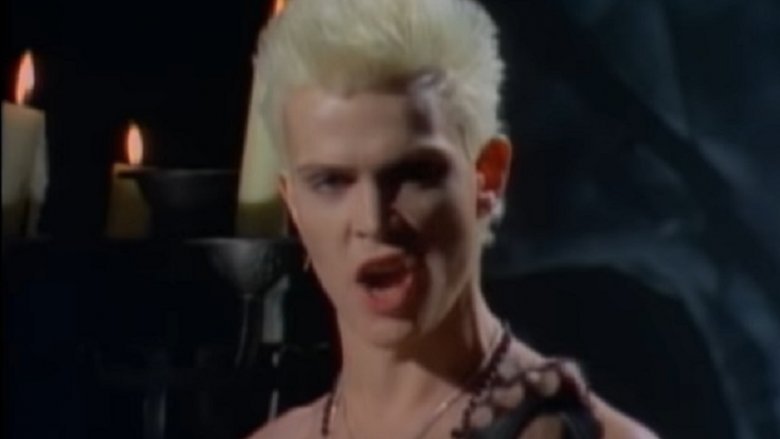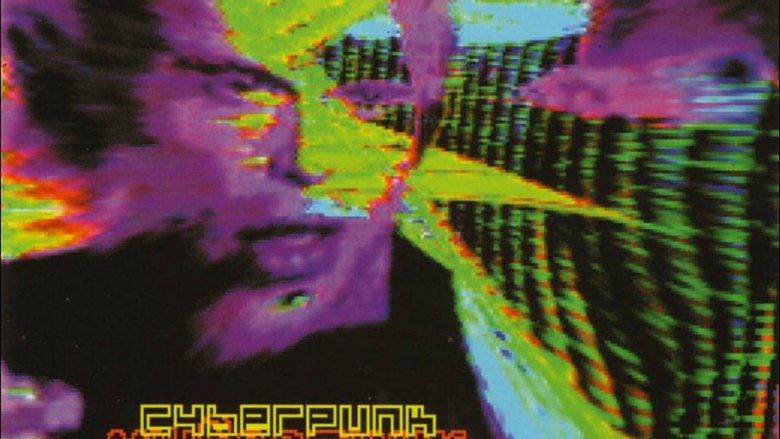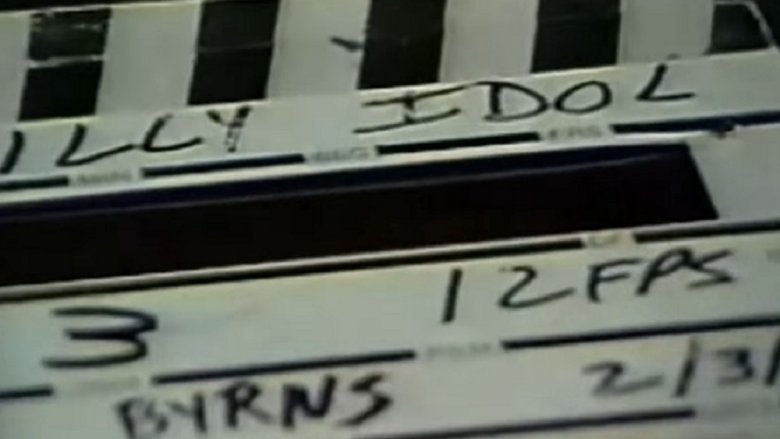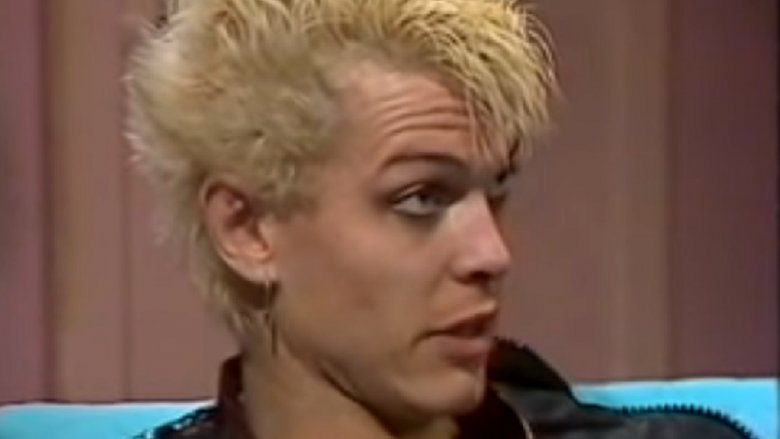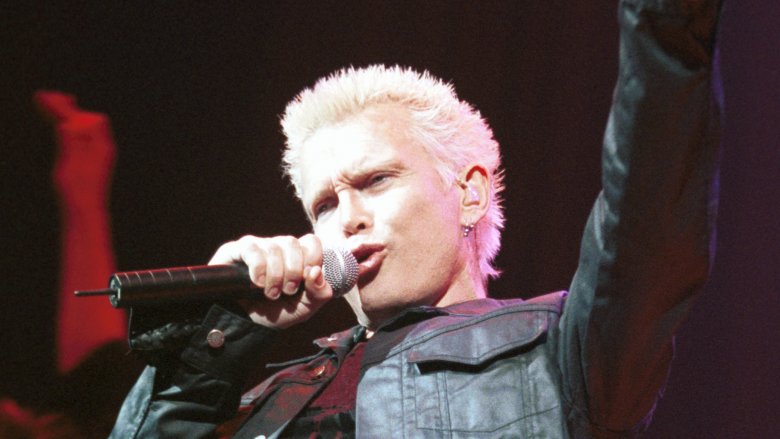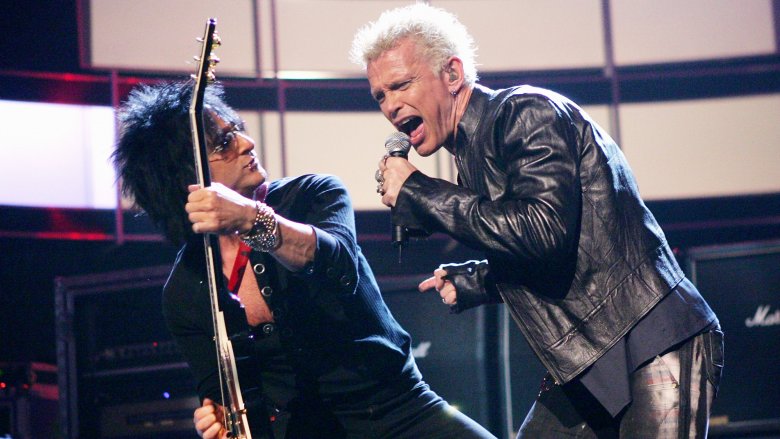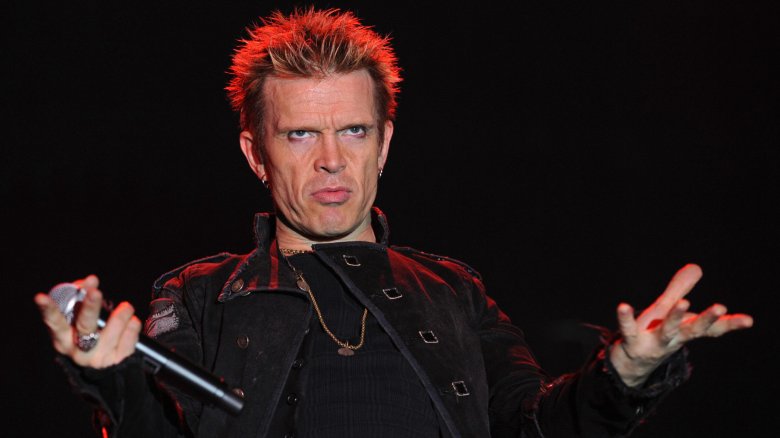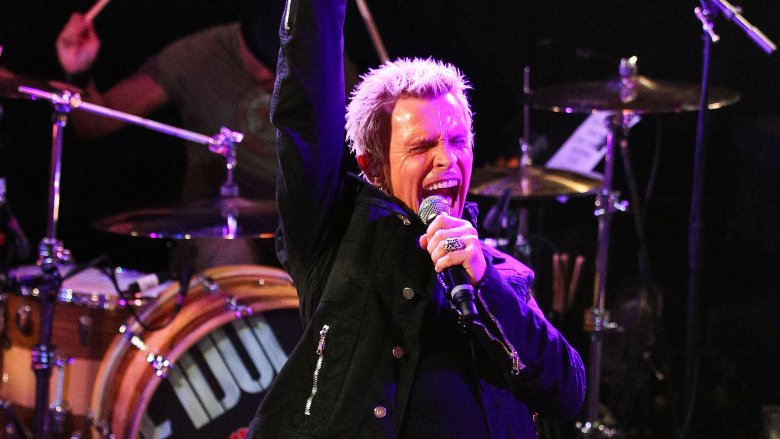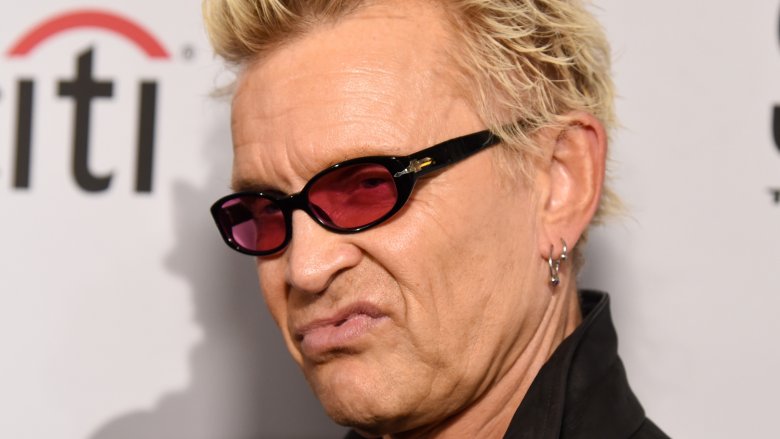Whatever Happened To Billy Idol?
English rocker William Broad, better known to the world as Billy Idol, was no less than the spiky-haired, bleach-blond, sneering face of the '80s. After seeing some success in the late '70s in the U.K. with his punk-pop outfit Generation X, Idol came to New York determined to launch a solo career, which might have crashed and burned if not for the timely intervention of MTV. His look, sound, and rock 'n' roll swagger were a perfect fit for the fledgling cable channel, and the dark and striking video for "White Wedding" propelled the single up the charts and helped make his 1982 solo debut album a modest success.
Then came 1983's Rebel Yell, a double-platinum smash that produced three hit singles and made Idol an international superstar. 1986's Whiplash Smile and 1990's Charmed Life kept the hits coming, but in 1993, his career hit the brick wall that was Cyberpunk, an ambitious, sci-fi blending of electronic and live instrumentation that confused fans and drew mockery from critics. One would be forgiven for thinking Idol simply dropped off the face of the Earth after that, but he never really went away. It may comfort you to know that as the world changed around him, he remained very much Billy Idol, the man who rocks to live and lives to rock. Here's what he's been up to since the abrupt end of his glory days.
His hot streak ended with a bang
In the wee hours of the morning on February 6, 1990, Billy Idol was having a tough time sleeping due to his excitement over having just wrapped up recording on the soon-to-be-ironically-titled Charmed Life, and also because of the copious amounts of booze and drugs still knocking around in his system from the previous night's session. At about 8:30, he boarded his 1984 Harley to head back to the studio to listen to the finished product one more time. He never made it. His journey was interrupted by a truck, which broadsided him as he blew a stop sign. He was admitted to Cedars-Sinai hospital with multiple compound fractures in his right leg, among an array of additional broken bones and internal injuries.
Idol's recovery was slow, but it didn't stop him from shooting a video for lead single "Cradle of Love" (in which he's seen only from the waist up, in video monitors) or touring in support of Charmed Life later that year. But unbeknownst to Idol, "Cradle" would be his final major hit. Perhaps the accident jogged something in his spiky head, but it was at this point that he decided it was time to update his sound for the digital age, even though it was the early '90s and nobody really knew what that meant yet. His next project would be ambitious, ahead of its time — and his first certified flop.
Flirtation with electronic music
Billy Idol's solo work had always relied on a deft blend of shredding guitars (courtesy of axe prodigy and collaborator Steve Stevens) and synthesized instrumentation, but 1993's Cyberpunk went all in on the latter part of that equation. Stevens had departed to pursue a solo deal prior to the recording of Charmed Life, and for this latest project Idol enlisted a stable of studio musicians (along with longtime producer Keith Forsey) to lay tracks in his PC-based home studio, complete with an early version of ProTools. In keeping with the record's futuristic aesthetic, it was among the first to be promoted with an electronic press kit, came with a screensaver on floppy disk, and even included Idol's email address, for the few people who knew what that even meant at the time.
It may have been ahead of its time, but those few people who comprised the internet community in 1993 weren't impressed, and neither were Idol's fans. Despite lead single "Shock to the System" being a minor success (thanks in part to a video directed by special effects wizard Stan Winston), the album went nowhere, and it would be Idol's last studio effort for over a decade. He did, however, have other career opportunities lined up — opportunities that may have proven a great deal more lucrative if that pesky motorcycle crash hadn't hobbled him for the better part of a year.
Dabbling in acting
Billy Idol's first attempt to break into movies came at the height of his '80s success, as then-manager Bill Aucoin decided that with the Rock God title already under his belt, film stardom should naturally follow. According to VH1's Behind the Music piece on Idol, Aucoin spent months pitching an adaptation of the rock 'n' roll vampire novel King Death, with Idol in the lead, to various studios, finding no takers. Idol would later call the whole idea a "debacle" that led to a parting of the ways with Aucoin, but by the early '90s, he had warmed to the idea.
His first major role was to be in Oliver Stone's 1991 Jim Morrison biopic The Doors, which would have been followed by a turn as the shape-shifting T-1000 in James Cameron's box office-breaking Terminator 2: Judgment Day that same year. Cameron had had Idol in mind for the role from the beginning; early renderings of the killer machine in storyboards were even drawn up to look exactly like the singer. But Idol's harrowing motorcycle crash left him unable to walk (let alone run after John Connor) for an extended period of time, throwing cold water on those plans. His Doors role was reduced to a cameo, and the T2 part was recast with Robert Patrick. Later in the decade he appeared in a little-seen flick called Mad Dog Time, followed up by an awesome appearance as himself in 1998's Adam Sandler comedy The Wedding Singer and a voice role in Heavy Metal 2000.
Close calls with drugs
It will likely come as a surprise to no one that at the height of his rock 'n' roll rabble-rousing, Idol never met a giant truckload of drugs he didn't immediately want to ingest. In his autobiography Dancing With Myself, he characterized his motorcycle accident as the catalyst for his finally getting off opiates, saying, "I was in the hospital and the doctor said, 'Mr. Broad, how can I tell it to you, the pain medication, you're drinking it in. Is there anything you want to tell me?' And I said, 'Yes, I'm a massive drug addict.' I was probably on morphine for two weeks but I was in the best place to get off it. I would be sweating all night long, it was a horrible experience coming off."
He claims to have overdosed several times, but one incident notably occurred in the public eye. In 1993, not long after the death of River Phoenix in an extremely similar incident, Idol collapsed outside the nightclub Tatou due to an overdose of GHB. By this time, his son Willem (born in 1988) was old enough to question what had happened, and it was this that finally put the brakes on his drug use. "Eventually there was a bit of a wake-up call," he said. "I had young children and eventually you think about, do they want a dad who's a bit messed up? And they don't want that."
A brief reappearance
In 2000, Steve Stevens — who was more than a little surprised that his old friend was still alive — reunited with Billy Idol to go on tour, and the pair returned to the public eye thanks to that Behind the Music episode, one of the series' craziest. Stevens told VH1 that during their time apart, when he would "read things, or hear things about what was going on ... a lot of it sounded a little bit scary, to be honest." But during the 2000 tour, Stevens was shocked to discover that times had indeed changed. "His son came out on the road with us," he said. "We'd check into the hotel, and Billy would be asking for a roll-out bed for Willem. I'd burst into laughter ... how different this was!"
The episode led to a well-received 2001 appearance on VH1's Storytellers series, in which Stevens and Idol — backed by Billy's current band — knocked out a killer semi-acoustic set full of hits, covers, and even a few Generation X tunes. The set was released as an album as well, and later that year, Idol's first Greatest Hits compilation hit record stores, which are things that used to exist. Included was a cover of Simple Minds' "Don't You (Forget About Me)," which was penned by Idol's faithful producer Keith Forsey. It would have been a fitting swan song to the rocker's career — but Idol had other ideas.
A return to form
A few years passed, and Billy Idol's fans could have been forgiven for thinking he'd retired to some farm in the U.K. to raise sheep or some such thing. But for Idol, the idea of no longer making music was about as tenable as the idea of never sneering again. In the early '00s, someone had the excellent idea for Idol, Stevens, and Forsey to get back into the studio to make a new album featuring a return to their classic sound — and in 2005, they shocked everyone by delivering Devil's Playground, which basically pulled a Halloween by ignoring everything that had come after Rebel Yell. Stevens was shredding, Idol was screaming, Forsey was ... Forsey-ing, and for fans of their '80s output, all was right with the world.
Even music industry observers were caught by surprise – Rolling Stone's review opened, "Did somebody say, 'New Billy Idol Album?' Thanks, God!" It seemed like some kind of minor miracle that a) the album existed at all and b) it was pretty good. The record peaked at #46 on the Billboard charts (notably, just one spot below his 1982 debut album), and Idol seemed poised for an ass-kicking, name-taking return — but even his most stalwart fans were in no way prepared for his next trick.
From White Wedding to White Christmas
Having waited 12 years between Cyberpunk and Devil's Playground, Idol decided it would be prudent to keep himself in the public eye with a quick follow-up. But, being Billy Idol, he did this in a way that absolutely nobody could have predicted. Just over a year after his return to blazing, hip-grinding rock, he graced the music-buying public with Happy Holidays, which is exactly what it sounds like. With a cover featuring a shockingly cleaned-up Idol draped in lounge-y fashion over a piano's keyboard, the album delivered what it promised — no "Rebel Yule," no "Flesh for Xmas," just Billy Idol singing earnestly straightforward versions of a laundry list of holiday standards.
This was, of course, greeted with widespread confusion if not gales of derisive laughter, but more than one music critic declared it to be an absolute must-listen. Said the Guardian in its three-star review, "Johnny Rotten once dubbed Billy Idol 'the Perry Como of punk,' but surely he can't have suspected that [he] would one day record a Christmas album. ... There's an undeniably surreal appeal to Idol's 'Silent Night' ... and a sherry-sodden 'Auld Lang Syne.'" One observer went even further: "Forget about the Nintendo Wii, the Playstation 3 or anything else that might be on your Christmas wish list. Billy Idol's Happy Holidays album is without a doubt the greatest thing about the 2006 holiday season. Don't deny it. You know it's true." Okay, so maybe not all the positive reviews were serious.
Continuing to pop up everywhere
After his Yuletide dabblings, Idol spent the better part of the next decade continuing to tour and pop up in odd places. 2008 saw the release of his second greatest hits album, The Very Best of Billy Idol: Idolize Yourself, which featured two new tracks (and, in keeping with his longtime love of all things internet, a third available exclusively for download). After this, he embarked on a worldwide tour with fellow '80s hard rockers Def Leppard and showed up regularly on the bills of various music festivals.
He even appeared in a Season 5 episode of Bam Margera's Viva La Bam, in which viewers might have expected him to turn up completely inebriated and injure himself in true Jackass fashion. But, no, his appearance was a special surprise for Bam's mother, April, who was celebrating her 49th birthday, and who had always been a massive fan. Once again, it seemed like Idol was entering the lovable old rock 'n' roll codger stage of his career, which simply had to be winding down at this point — but, once again, he was quietly getting ready to remind the world that he literally couldn't stop rocking if his life depended on it.
Kings & Queens of the Underground
Idol and Stevens spent the first few years of the next decade largely out of the public eye, but rather than playing hardcore shuffleboard in a headbangers' retirement home somewhere, they were doing what they'd always done: writing songs. Enlisting producer Trevor Horn (formerly of Yes and The Buggles, the band who fingered Video in the heinous murder of the Radio Star), they spent most of 2014 in the studio cranking out new tracks — and in December of that year, they dropped Kings & Queens of the Underground, Billy Idol's seventh studio album.
Critics were mostly kind. Rolling Stone singled out standout track "Can't Break Me Down" as "a punky pop tune with a ... chorus catchier than anything Fall Out Boy have written lately," and Ultimate Classic Rock praised Idol for being "more interested in exploring new, more mature territory than in recapturing his Rebel Yell heyday." Also in 2014, he released the aforementioned autobiography Dancing With Myself, a New York Times best-seller which didn't skimp on the sordid details of Idol's hedonistic early years. "I am hopelessly divided between the dark and the good, the rebel and the saint, the sex maniac and the monk, the poet and the priest, the demagogue and the populist," he wrote. "Pen to paper, I am putting it all down, every bit from the heart." As if he has ever done anything any other way.
Rebel yelling into the future
Way back in the day, before the release of his first solo record, Billy Idol had announced his arrival in New York with the release of a little-heard EP called Don't Stop, a title he has since seemed to adopt as his personal mandate. He's now over 60, but if you think he's going to stop rocking any time before he's literally forced to by Death himself, you must be as high as Billy Idol currently isn't. He's long since tamed his drug demons, saying on his website, "Now I live for going on stage, that's the biggest drug, the biggest high. I still have a couple of drinks but I don't need to be up there drunk or f*cked up, I get high off the music, whether it's new music or old."
Or, even a little of both. A gaggle of EDM artists recently paid tribute to Idol's 1987 remix project Vital Idol with a compilation entitled Vital Idol: Revitalized, which features remixes of his biggest hits from the likes of The Crystal Method, CRAY, and Tropkillaz. But the fact that Idol always seems to be looking to the future doesn't mean he has no appreciation for tradition. In September 2018, he announced that Steve Stevens will join him in holding down a ten-date Las Vegas residency at the Palms Casino Resort — the ultimate destination for a man who has been on the road to Sin City his entire life.
